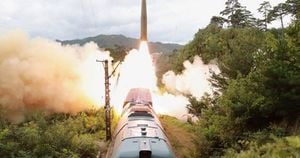Australia is currently facing significant strategic challenges in the Pacific region, with rising tensions primarily stemming from China's increasing influence. The need for Australia to assert its presence and partnership within this complex geopolitical environment has never been more pressing.
Recently, the conversation around Australia's foreign policy and regional dynamics gained momentum following remarks from Foreign Minister Penny Wong. Wong commented on China's aggressive tactics, stating, "China's doing what great powers do, and great powers try to lift their influence and expand their influence in the region they wish." This statement reflects the inherent challenge Australia faces—navigiating relationships with both neighboring countries and major powers without compromising its sovereignty or security.
The long-standing post-World War II international system has been grounded in the principle of mitigating the unrestrained power of large nations. This system emerged to counter military aggression and more subtle forms of coercion, such as economic manipulation and cyber intrusions. Yet, recent actions from China, including cyber attacks against the Pacific Islands Forum, have raised alarm over the erosion of these established norms.
China’s approach has been characterized by its hybrid warfare tactics, which include disinformation campaigns and attempts to wield influence over Pacific nations through economic incentives and security agreements. These activities are not just limited to the Pacific; they have raised concerns about China's broader ambitions on the global stage.
One notable event occurred when Australia successfully urged Papua New Guinea to reconsider potential security pacts with China. This came after China's Foreign Minister Wang Yi visited the country, pushing for agreements on trade and policing. Following Australia's objections, Prime Minister James Marape of Papua New Guinea decided to hold off on this deal, highlighting the weight Australia still carries within the region.
On the cooperative front, Australia has also been proactive. Recently, Australian leaders announced new partnerships aimed at strengthening ties with Pacific Island nations. One such initiative is the Pacific Police Support Group, part of the broader Pacific Policing Initiative supported heavily by Australia. The goal? To bolster local policing capabilities and provide disaster response assistance, fostering regional stability.
Australia's commitment to its neighboring nations is reflected not just through security measures but also through humanitarian assistance. Amid the recent crises, such as the repeated conflicts involving Israel and Hizballah, Australia pledged additional humanitarian support to Lebanon, amounting to AUD 10 million. This initiative is part of Australia’s broader strategy to engage positively with its international partners.
Back on Australian soil, the government is taking significant actions to bolster its economic stance by ratifying key labor conventions outlined by the International Labour Organization, enhancing protections for workers across various sectors. These efforts underline Australia’s ambitions not only in foreign policy but also in domestic welfare.
With such comprehensive initiatives—ranging from partnership developments with the UK on renewable energy to engaging First Nations groups for tourism—Australia is positioning itself as not just a player but potentially the stabilizing force within the Indo-Pacific region.
Yet, with the specter of China looming large and consistently challenging the established order, Australia faces scrutiny over its policies. While some analysts argue for engagement with Beijing, others warn against complacency, adamantly asserting the need for firm resistance against predatory practices. Therein lies the heart of Australia's dilemma: balancing cooperation and deterrence without tipping the scales against either side.
International relations have always been about power dynamics, and as Wong has pointed out, the Pacific is becoming the theater of what she called "permanent contest." This paints a stark picture of the challenges for not only Australia but also its allies as they navigate this contentious atmosphere.
The narrative surrounding China is also shifting. Further discernment of its actions reveals how China's rising ambitions manifest not just as military shows of strength but as systematic, premeditated efforts to reshape economic dependencies across the Pacific. This creates concerning precedents for how international governance structures may evolve—or devolve—in response to such assertive foreign policy.
Supporters of proactive measures argue for Australia to continue leveraging its historical ties and shared values with its neighbors. Taiwan, for example, has increasingly found itself drawn closer to Australia as both nations share concerns over Chinese influence. Australia's role as a partner of choice, rather than merely another voice, is one the government continues to pursue fervently.
The ramifications of this strategic contest extend beyond mere regional skirmishes; they have global significance. From the capital cities of major powers to the rural heartlands of Pacific nations, the choices made today will undoubtedly carve out the future of international relations.
At the crux of all this is the reality Australia faces: the international order is highly nuanced, and as China attempts to redefine its role within it, nations must reevaluate their responses. Standing by and merely observing will not suffice. Rather, Australia must engage thoughtfully and firmly, committing to uphold the value of the longstanding rule-based order.
The framework of this order is challenged daily by those who wish to circumvent established norms. Australia, as one of the steadfast proponents of these norms, is faced with the formidable task of outmaneuvering not only regional but also global pressures. The choices made now will resonate for generations to come, requiring both courage and vigilance.
By enhancing its collaborative efforts with neighboring countries, engaging with international partners, and showcasing leadership, Australia can seek to maintain stability amid the upheaval caused by power shifts. It must reinforce its resolve and endeavor to establish itself as both the bulwark against disruptive influences and the trusted ally eager to help shape the future of the Pacific.
How Australia navigates this turbulent terrain will determine not just its future but quite possibly the coherence of the Pacific region itself. A steadfast approach emphasizing partnerships alongside measured deterrence can provide Australia with the leverage it needs to influence positive change and maintain equilibrium.



